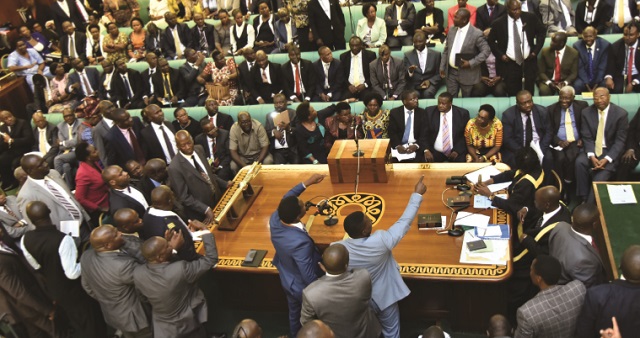
#AGELIMIT: The 4 fights frustrating Museveni
Kampala, Uganda | HAGGAI MATSIKO | Finally, there was a proper fist fight in parliament on Sept.26 over lifting the 75-year constitutional age limit to allow President Yoweri Museveni to contest again in 2021. He will officially be 77 years old by then and he will have been in power for 35 years.
The kicking, pulling of ties and jacket lapels, and hurling of chairs at each other was the climax of an anticipated showdown between a motley bunch of opposition MPs and the dominant ruling NRM party MPs.
Speaker Rebecca Kadaga had attempted to spring a surprise on the MPs by delaying to the last minute the inclusion of the controversial age-limit Bill on the Parliament Order Paper of business. But the ruse flopped and she was forced to shelve it – for the second time.
Similar scenes on Sept.21 had led the Deputy Speaker of Parliament to postpone tabling of the controversial Bill. On that day security forces; police and the army deployed heavily around parliament and surrounding environs. They arrested several prominent opposition politicians in morning swoops on their homes in scenes that were condemned by many, including the Uganda Human Rights Commission.
The offices of some non-governmental organisations—Godber Tumushabe’s Great Lakes Institute For Strategic Studies (GLISS) and ActionAid—were also raided as police accused them of fueling the anti-age limit lifting tensions.
The U.S. embassy and the EU issued a statement saying they were “deeply concerned” about the arrests and actions targeting political activists. They said the events tarnish the country’s image and appeared designed to stifle the Ugandan people’s right to free expression.
Deputy Speaker Oulanyah criticised the siege of parliament by security forces which was seen as reminiscent of the 1966 incident when then-Prime Minister Milton Obote deployed security forces around parliament and MPs passed the so-called “Pigeon-Hole Constitution” without reading it.
Magyezi’s nightmare
But the most affected person was possibly a little known MP Raphael Magyezi, of Igara West constituency in Bushenyi, western Uganda.
Sept.21 was supposed to mark a turning point for him. He had clawed his way to the top of the pack of MPs from the ruling party NRM who were clamouring to move the motion to remove the presidential age limit of 75 years from the constitution. Although architects of the campaign deny it, the sole purpose of the move is to let President Museveni to run again.
Magyezi was also excited that some of the nation’s top legal brains, city top lawyer Kiryowa Kiwanuka and the president’s lawyer son-in-law, Edwin Karugire had drafted the Bill he was to move, insiders said.
The law firm of this duo is always central in President Museveni’s political machinery when mobilisation drives and campaigns need brains and ruling party candidates need help with election petitions in the courts. In 2016 they defended President Museveni in a Supreme Court suit against his election brought by former Prime Minister Amama Mbabazi, who had managed 1.4 percent in the elections.
With everything in place, it was obvious to all that if Magyezi played the part well, the reward could be big. They had seen it before – in 2014.
At the time, Evelyn Anite was a little known Youth MP for northern Uganda. But her turning point came on Sunday February 9, 2014, when she upstaged ruling party stalwarts with a master stroke executed with the ease of a practiced schemer. The scene was a meeting of the NRM Caucus at its Kyankwazi school of ideology and then-powerful prime minister Amama Mbabazi looked set to challenge President Yoweri Museveni in a tussle to be the party flag-bearer in the 2016 presidential election. The atmosphere was tense. Then Anite knelt dramatically and moved a simple motion; that Museveni should be the sole NRM candidate. She then upped the ante by announcing that all MPs in favour should sign on the motion. Mbabazi was cornered and had no choice but to sign. A few months after Museveni won re-election, Anite was rewarded with a ministerial position. Magyezi was possibly dreaming of something similar.
He had the numbers on his side. Magyezi and his co-schemers imagined the Bill sailing smoothly through parliament because the NRM has a 290-strong majority. Of these, 288 had already been lobbied and committed to support the move. The planners also had a majority of the over 50 Independent MPs on their side. But just a week earlier, they got another boost. The NRM swept election for MPs in five new districts. The five army representatives were also expected to vote for the ruling party.
So Magyezi’s camp is working with potentially 340 votes in the bag. Although the additional five newly created districts had expanded the number of legislators from 429 to 434, winning the vote in parliament requires only a 2/3 majority or 289 votes. With support from 340 legislators, it appears a cool 51 legislators will be a bonus. Cabinet has also given Magyezi a green light.
Up to 280 legislators have already appended their signatures to a document meant to show support for his motion and the resultant bill.
But on Sept.20, he suffered a setback. He was informed that his motion would not be on the Order Paper for Parliamentary business as had promised.
 The Independent Uganda: You get the Truth we Pay the Price
The Independent Uganda: You get the Truth we Pay the Price




This is a informative post.I had never seen like this post.I learn many think about law.